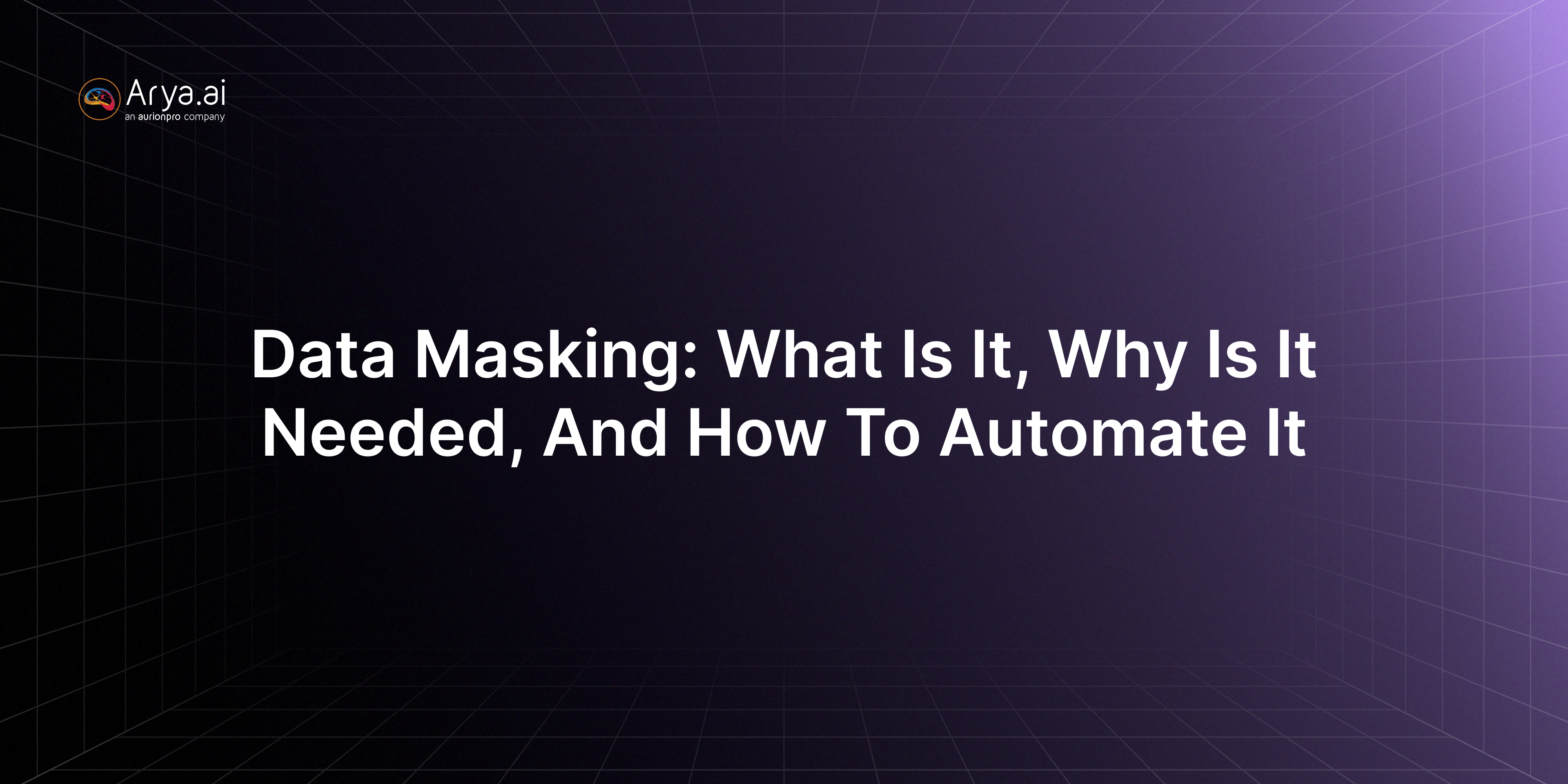
Data is key to organizational growth. Its value has grown over the years, as businesses try to capitalize on collected user data.
However, this data must be protected to maintain integrity and comply with regulations. Data masking has emerged as a key pillar of data protection in this landscape.
What is Data Masking?
The definition may sound similar to encryption. However, the one key way data masking differs is that masked data stays readable and functional, which is critical for AI model training and software development. In contrast, encrypted data requires a decryption key and isn’t meant for live use.
Masking credit card numbers to display only the last four digits is a classic example of data masking. Swapping real names with pseudonyms or hiding Aadhaar numbers while preserving the integrity of the format are other standard samples.
Why Data Masking Matters
This process allows organizations to maintain confidentiality and security while enabling data usage for development, testing, and analytics. For instance, PII masking helps organizations protect individual users’ data.
Here are some key reasons why data masking is essential for businesses to ensure security, compliance, and operational efficiency:
Regulatory Compliance
Data privacy laws such as GDPR, HIPAA, CCPA, and India’s DPDP Act require businesses to protect personally identifiable information (PII). Failure to do so can result in financial penalties and reputational damage. As companies start using organizational data for training domain-specific models, keeping the data in line with AI regulations becomes crucial. Properly masked data can help companies demonstrate compliance and even reduce the scope of regulatory oversight by rendering datasets anonymous.
Third-Party/Outsourced Operations
Masking data reduces the risk of breaches, primarily when organizations work with vendors and off-site partners, by ensuring only the sanitized data is passed downstream.
Ethical AI and Bias Reduction
Training AI/ML models on masked or anonymised data reduces the risk of privacy leakage and helps curb inherent bias in model predictions by excluding demographic identifiers.
Insider Threat Protection
Not every internal user needs access to raw PII. Dynamic masking helps with granular access while preserving operational functionality.
Securing Non-Production Environments
Testing and development teams often use production data to ensure realism, but exposing real data in non-secure environments creates unnecessary risk. Masking enables safe, high-fidelity data copies for these use cases.
Traditional vs. AI-Powered Masking: A Quick Comparison
Traditional data masking methods rely on fixed rules and manual processes, which can be cumbersome and error-prone, especially as data volumes grow. On the other hand, AI-powered masking utilizes intelligent algorithms to automate and optimize the process, providing greater efficiency and accuracy.
Below is a comparison of the key features of traditional data masking versus AI-powered masking:

Automating Data Masking at Scale
Manually masking data across dozens or hundreds of systems is impractical. Traditional or manual data masking methods struggle to scale effectively as organizations handle increasing volumes of sensitive data. Automating data masking at scale ensures consistent protection across large datasets, reduces the risk of human error, and supports efficient compliance, all while maintaining the integrity and usability of the data.
Here’s how organizations automate their data-masking process:
Data Discovery and Classification
Modern platforms automatically scan databases and unstructured sources (emails, PDFs, logs) to identify PII and PHI (Protected Health Information). AI-driven classification ensures accuracy, even in poorly labelled or free-text data.
Static and Dynamic Masking
Static Masking creates masked copies of datasets for use in dev/test environments. Dynamic Masking alters data on the fly, depending on who is accessing it, without changing the underlying source.
Deterministic and Reversible Techniques
Organizations often use deterministic masking to ensure consistency across systems (e.g., “Alice Smith” always becomes “Jane Doe”). Some scenarios also call for reversible masking (e.g., tokenization data must be retrievable under controlled conditions.
Integration with CI/CD Pipelines
Advanced masking solutions integrate into DevOps workflows, ensuring that every test or analytics environment gets masked data automatically. This removes human error and reduces the time to deployment.
AI-Powered Data Masking: The Intelligent Edge
Introducing AI has helped businesses revolutionize the masking process by identifying, protecting, and managing sensitive data. Rather than relying on hardcoded rules, machine learning and natural language processing (NLP) can discover patterns, context, and hidden PII in vast, unstructured datasets.
Key advantages of AI-driven data masking:
- High accuracy: Trained models can outperform regular expressions in detecting names, Aadhaar numbers, account IDs, etc.
- Contextual awareness: NLP models understand sentence structure and semantics, enabling masking that retains meaning.
- Real-time responsiveness: AI models can process and mask live data in streaming pipelines with minimal latency.
- Multilingual capability: AI tools can mask data across multiple languages to help overcome the language barrier, which is critical for MNCs.
Introducing Apex by Arya. AI: Bespoke AI-Powered Data Masking
Apex by Arya.AI is a low-code AI API platform for automating enterprise workflows, including robust PII masking and Aadhaar data anonymization. We’ve built solutions like the PII Masking API for organizations to conceal individual users’ information. Another such data masking module we offer is the Aadhaar masking API.
These are pre-trained solutions. If you need a bespoke data masking solution or software, contact us. Our solutions are scalable, accurate, and compliant.
Conclusion: The Future Is Adaptive and Intelligent
Data is undoubtedly the fuel driving rapid digital transformation. With its ever-increasing importance, the need for privacy, security, and trust continues to rise. Hence, businesses can no longer rely solely on static masking scripts or manual redaction and require AI-powered solutions.
Apex by Arya.AI helps organizations protect sensitive data across diverse environments, languages, formats, and use cases by providing intelligent and flexible data handling while complying with global regulations.
Book your demo for Apex by Arya.AI and adapt smart data protection for an intelligent future.





.png)





.png)
.png)



.png)
.svg)


